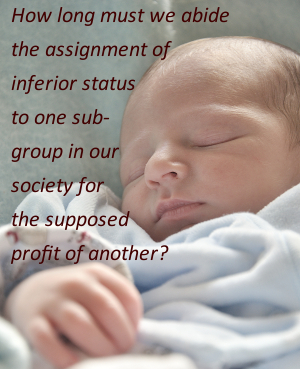Abortion clinic director quits after witnessing abortion
Body
Story at Fox News
Discussion
Abortion Opponents Scrap Over Use of "Operation Rescue" Name
Body
LA Times reports.
Discussion
Obama and the Next Frontier of Human Rights

On January 20 of this year, Barack Obama was sworn in as the 44th President of the United States of America. This momentous occasion did not mark the death of racism in our land. It did, however, betoken a crucial stage in the sluggish uprooting of racism’s influence upon this nation. It is no small matter that the majority of voting Americans in the election resolved to appoint an African-American to the highest office in the land—arguably to the most powerful governmental post on the planet. This marks a groundbreaking advance toward an America in which one’s abilities and opportunities are wholly disentangled from levels of melanin in one’s skin—toward an America in which citizens of every class and ethnicity share equal status as creatures made in the image of God.
Just days before Obama’s November 4 victory at the polls, I made a rather timely visit to two museums. Each of these museums preserves on display the viewpoint of onetime purveyors of a societal vision that hinged on the perceived inferiority of a specific class of people. The Gettysburg Museum in Pennsylvania and the Holocaust Museum in Washington D.C. each immortalizes the convictions of sincere intellectuals who sought to elevate one segment of society by oppressing another.
Alexander H. Stevens, Vice President of the Confederate States of America, declared that the “cornerstone” of the Confederacy “rests upon the great truth that the Negro is not equal to the white man; that slavery, subordination to the superior race, is his natural and moral condition.” In the hallowed halls of the U.S. Senate on March 4, 1858, Senator James Henry Hammond of South Carolina proclaimed: “Our slaves are black, of another and inferior race.”
Countering such sentiments, Abraham Lincoln declared in a debate at Galesburg, Illinois (October 7, 1858): “I confess myself as belonging to that class in the country who contemplate slavery as a moral, social and political evil …” In a letter to Albert Hodges, Lincoln wrote: “If slavery is not wrong, nothing is wrong.”
Consider this carefully: These two radically distinct ideologies were vehemently defended and publicly debated by sincere Americans. Mercifully, the viewpoint that eventually prevailed insisted that oppressing one class of people to protect the status of another was not only evil, but degrading to the protected class—a thesis Booker T. Washington ably championed in his autobiography, Up from Slavery. The presidency of Barak Obama rides on the wings of this achievement.
Discussion
The Death of “Doctor Death”
Editor’s Note: This article is reprinted with permission from Doug Kutilek’s free newsletter “As I See It,” a monthly electronic magazine, and appears here with some editing. AISI is sent free to all who request it by writing to the editor at dkutilek@juno.com.
 On Sunday morning, May 31, 2009, around 10 a.m., Dr. George Tiller, perhaps the most notorious practitioner of late-term abortions in America, was killed in the lobby of a Lutheran church in east Wichita by a lone gunman who fired a single shot into Tiller’s head. Tiller quickly passed into eternity on the floor of the church lobby. He had survived a previous assassination attempt outside his east Wichita abortuary some fifteen years earlier. (Photo credit: L.A. Times)
On Sunday morning, May 31, 2009, around 10 a.m., Dr. George Tiller, perhaps the most notorious practitioner of late-term abortions in America, was killed in the lobby of a Lutheran church in east Wichita by a lone gunman who fired a single shot into Tiller’s head. Tiller quickly passed into eternity on the floor of the church lobby. He had survived a previous assassination attempt outside his east Wichita abortuary some fifteen years earlier. (Photo credit: L.A. Times)
The perpetrator fled the scene. A suspect, alleged to be the assassin, was apprehended in the Kansas City area (where he lived) less than four hours later and was returned to Wichita where he was subsequently charged, along with other crimes, with first degree murder. Under Kansas law, this offense does not carry the death penalty.
Though I never met George Tiller, I once met his father, Dr. Jack Tiller, who had a family practice at Oliver and Kellogg in east Wichita back in the 1960s and early 1970s. In high school and for a time in college, I was an afternoon delivery driver for a small pharmaceutical company and occasionally made deliveries to Jack Tiller’s office.
When Jack Tiller died in a plane crash in the early 1970s (I don’t recall the precise year), George, not long out of medical school, came to Wichita to take over his father’s practice. This development was close in time to the Roe v. Wade Supreme Court ruling that opened the floodgates to American infanticide. I don’t know if George Tiller ever practiced any kind of “medicine” other than abortion. If so, he soon abandoned it, and the whole of his practice was dealing death to the unborn in cooperation with the mothers of these innocents.
Discussion
"(A)bortion is 'no tragedy: it's a good decision.'"
Body
Discussion
"Abortion is a blessing and our work is not done."
Body
“This woman is evil. She is an evil person who preaches evil, and is a conscious agent of the culture of death. She is the enemy. We are, of course, to love our enemies, but that doesn’t make her any less the enemy.”

Discussion